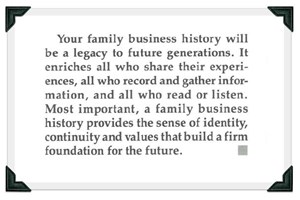This article originally appeared in The Family Business Advisor in 1992.
Witt Stephens, 84, legendary founder of Little Rock’s powerful merchant bank, Stephens & Co., passed away in early December. Thousands attended the funeral.
Younger brother, Jack, 67, had been the second CEO and president of the 400-employee family business. Jack’s son, Warren, 34, took the reins in 1986.
Finally alone after the funeral, Warren was sitting quietly with his own thoughts. He brought out a video cassette and turned on the unit. There was Uncle Witt, talking about the development of the company. Warren watched the entire tape. “Then, I was ready to move on,” he commented.
“I’m awfully glad we took the time to do an oral history,” Warren said. “It was really simple and inexpensive. But it sure meant a lot to me and to every one in the Stephens family — now and in the future.”
Family histories can be important to any family — but they are especially valuable to family businesses. A family business history can help the family to understand the motives and philosophies of the business’ founders and builders. Seeing the challenges they faced and learning how difficulties were overcome — clarifying the values on which the business and the family are based — are other reasons that should persuade you to take the time to record your history.
The process of producing your family business history may be simple or complex. On one extreme, historians can be hired to dig out all available source materials and interview everyone remotely associated with the family and firm. Such professionals can place the organization in the context of its community and times. On the other hand, a founder can just turn on a tape recorder or scribble some notes about the way it was and how things got to be the way they are now.
The ready availability and ease of operating a camcorder makes videotape an accessible and powerful tool for recording family history. Many people find audiotape less intimidating, however. Some are pleased with raw tape recordings. Other families edit the tapes, adding narration or even music. Some families publish pamphlets or books incorporating photographs, reprints of advertisements, newspaper articles or correspondence, family trees, or other artifacts of business and family life. The head of one famous family business commissioned a book about the business he founded, but allowed only five copies to be printed. He wanted access to the story restricted to family members.
Anyone can take the initiative. Putting together the family business history can be particularly valuable for the recent retiree or one who is being groomed for leadership. The retiree’s breadth of experience and need to make different but valuable contributions to the family business make him an obvious choice. A thorough understanding of the family business’ philosophy, strategy and past can result from a younger person’s effort to record history. Such understandings are invaluable for future family business leaders.
Preparing to record your history means collecting photographs, documents and artifacts into some kind of family business archive. If the effort is to be comprehensive, it may be necessary to identify and interview former employees or aged associates of previous generations of family business leaders.
As interviews are planned, think through and write down key ideas and incidents that you want to probe. Ask how and why things happened, as well as the what, where, when and who. Ellen Miller, Harvard Law School media services director, says that you need only prepare the first few questions (the rest will come naturally), but that those questions should not be too open-ended.
As you interview, “don’t feel compelled to fill every silence,” Miller suggests, “give your subject time to collect his or her thoughts and to answer completely.”
Miller makes one other key point: “Don’t wait too long.” The onset of Alzheimer’s disease impaired her mother’s ability to share her experiences.
Your family business history will be a legacy to future generations. It enriches all who share their experiences, all who record and gather information, and all who read or listen. Most important, a family business history provides the sense of identity, continuity and values that build a firm foundation for the future.
Worthwhile Guides:
K. A. Kerr, A. J. Loveday and M. G. Blackford, Local Businesses: Exploring Their History. The Nearby History Series. The American Assoc. for State and Local History, 1990. 172 2nd Ave. N., Ste. 202, Nashville, TN 37201.
Vera Rosenbluth, Keeping Family Stories Alive. Hartley & Marks, Inc., 1990. Box 147, Point Roberts, WA 98281.

